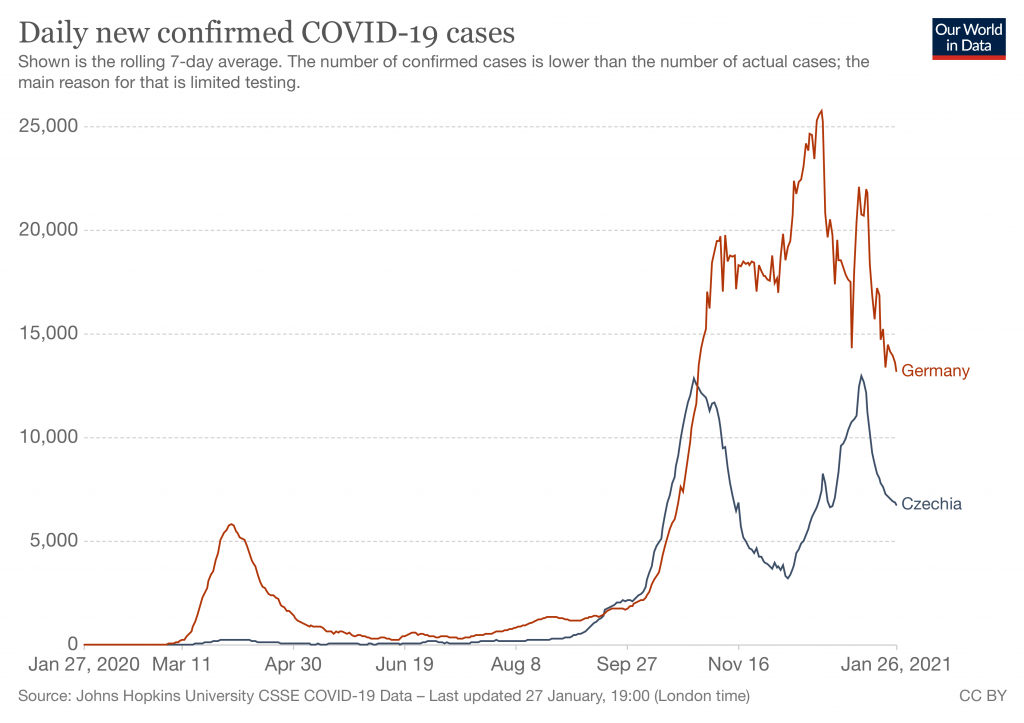A Test for Democracy and Civil Society
The lack of trust, permeated throughout Czech society, constitutes a huge hurdle to overcome, as faith in government officials, democratic institutions and medical experts will determine the outcome of these trying times. As the pandemic shows no signs of slowing down, weaknesses within the Czech Republic have quickly risen to the surface. Although the country has experienced a democratic “golden age”, since the end of communism, the government must address the issues on a community level, as liberal democracy may succumb to twisted forms of civil society, based on misinformation and tribalism.
A Legacy of Mistrust
The year 2020 has been a true test of global readiness and response, as governments struggled to control the spread of the virus, confiding in a potential vaccine to quell the disorder. Although the vaccine development largely met the imposed deadlines of early 2021, achieving great technical strides in the process, now, governments must do their part in assuring their timely distribution and administration. In countries like the Czech Republic, however, this process may prove more difficult than otherwise thought. According to recent data, stemming from a Polish case-study, over 30% of Czechs are unwilling to be vaccinated, when the doses will become available to the general public. This striking level of skepticism, both towards the government, as well as on a community level, may actually represent the remnants of the country’s communist past. Although the historical motives behind this attitude may seem justifiable, this distrust may prove to be extremely dangerous, considering current circumstances.
The Current Situation
In the early stages of the pandemic the Czech Republic was hit relatively lightly compared to other European countries. The response launched by the government was effective, praised for its swift action in lockdowns and sanitary precautions (Smith-Spark, Kottasova. 2020), however, problems arose in Fall of 2020, after restrictions were heavily lifted during the Summer months.

The graph above shows the number of Czech cases compared to its German neighbor. Although the latter of the two boasts higher figures for most of the year, the proximity of the numbers, especially in the months of September and October, (where the Czech Republic overtakes Germany in cases) is alarming when considering that Germany has a population of 83 million, compared to the Czech Republic’s 11 million. The situation was exacerbated by a failure to control mass movement, as the Czech-German border has remained active, with Czechs flocking to Germany in order to escape the tightening restrictions, forming queues and pressuring existing facilities.
Low Trust Could Severely Impact Vaccine Effectiveness
The severity of the pandemic in Europe is only more troubling when learning that large portions of the Czech population (and many other nationalities) are unwilling to be vaccinated due to underlying skepticism. “A regional poll conducted by Sinophone Borderlands project of Palacky University Olomouc painted a … worrying picture: only 30% of Czechs would be willing to vaccinate against COVID-19, the second-lowest score of the 13 European countries surveyed and just behind Slovakia” (Hutt. 2021). This striking level of skepticism is usually attributed to the communist past of the country, which finally transitioned to a democracy following the events of 1989.

As seen in the World Values Survey graph, around 70% of the population exhibits mistrust on a community level. The problem is that skepticism is not limited to the government, but quite widespread throughout society, accounting for high levels of individuals that do not trust the safety or effectiveness of the vaccine response, choosing to ignore the opinions of medical experts. According to David Hutt, the widespread vaccine skepticism “appears so entrenched that senior politicians are worried that it may not be possible to get two-thirds of the population immunized” (Hutt. 2021).
Skepticism as a Product of Communism
In her analysis of social capital and civil society, Natalia Letki points out that more liberal societies tend to exhibit higher levels of trust, both interpersonal and governmental, whereas authoritarian regimes appear to be lacking in that department. “Citizens living in countries with longer histories of democracy are more likely to express trust in others, and those who are more trusting, are also more liberal and tolerant” (Letki. “Social Capital and Civil Society“. p. 162). One aspect of the country’s society that has definitely fueled the skepticism is the rising numbers of people who promulgate fake conspiracy theories, undermining the trust in authorities. The Prime Minister of the Czech Republic, Andrej Babis, was one of the first people to receive the vaccine, showcasing it publicly, in an effort to boost the country’s confidence. Sadly, the success was short-lived, as conspiracy theories surged in the aftermath of the publicity stunt. “After Babis’ inoculation, conspiracy theories were quick to spread on social media. Some claimed that video footage didn’t show the needle going into the prime minister’s arm, as the doctor’s hand masks this, and was a scam. Others claim he was injected with a placebo.” (Hutt. 2021). The high levels of skepticism, due to its authoritarian past, combined with waves of conspiracy theories could greatly undermine the covid response, presenting a true danger for the Czech population.
Impacts on Democracy
All things considered, democracy in the Czech Republic is still strong, with institutions such as Freedom House giving it a score of 91/100. The situation becomes more complicated when considering the long-term impacts of widespread skepticism and misinformation, which have dominated Czech civil society, as of late. The growing vaccine conspiracy theories are just one manifestation of a larger threat within the established system. Although a functioning civil society is often linked to liberal democracy, this does not apply to all cases. The networks created by social capital and civil society could potentially pose existential threats to democratic practices. Letki distinguishes between “bridging” and “bonding” networks, where the former is focused on connecting people with differing backgrounds/ideologies, whereas the latter tends to form relations between individuals of the same background and social outlook (Letki. “Social Capital and Civil Society“. p. 165). While civil societies based on bridging usually benefit democracy, those based on bonding reinforce tribalism, which have the potential of undermining liberal democracy. The struggle to deal with the global pandemic underlines the fact that Czech civil society is clearly based on bonding rather than bridging. Social media platforms may be responsible for this surge in tribalism, as they fail to expose users to people of differing opinions, creating “social bubbles” disconnected from reality.
Where does this leave us?
Although it is still early to say, the data coming from the Czech Republic is not very reassuring. The country’s communist legacy may account for the high levels of skepticism, regardless, the government will have the momentous task of reinstating public trust, by the time the vaccines are readily available. In order to mount a successful vaccination campaign, which should reach a minimum of 2/3 of the population, authorities must rely on a healthy civil society to aid in the effort. This means that vaccination efforts should not be limited to a single institution (such as a health organization or by the government), but engage with the public on a community level. In order for this to be successful, mass coordination and collaboration is required, however, it would be wise to limit the dependence on social media, as the main means of spreading information, countering tribalism and misinformation in the process.
Aligi G. Ciancio, political science major at SUNY Geneseo, graduating Fall 2021.
“Anger on Czech border as Germany demands virus tests.” France24, Jan. 25th 2021, https://www.france24.com/en/live-news/20210125-anger-on-czech-border-as-germany-demands-virus-tests
Hutt, David. “Why are Czechs the among Europe’s most skeptical when it comes to vaccines.” euronews, Jan. 6, 2021. https://www.euronews.com/2021/01/06/coronavirus-why-are-czechs-among-europe-s-most-sceptical-when-it-comes-to-vaccines (Links to an external site.)
Ivana, Kottasova, and Laura Smith-Spark. “Czech PM apologizes as country suffers in Europe’s second coronavirus wave.” ctvnews, Oct. 22nd 2020, https://www.ctvnews.ca/world/czech-pm-apologizes-as-country-suffers-in-europe-s-second-coronavirus-wave-1.5155960
Letki, Natalia. “Social Capital and Civil Society.” Democratization, Oxford University Press, 2009. p. 162-163.
